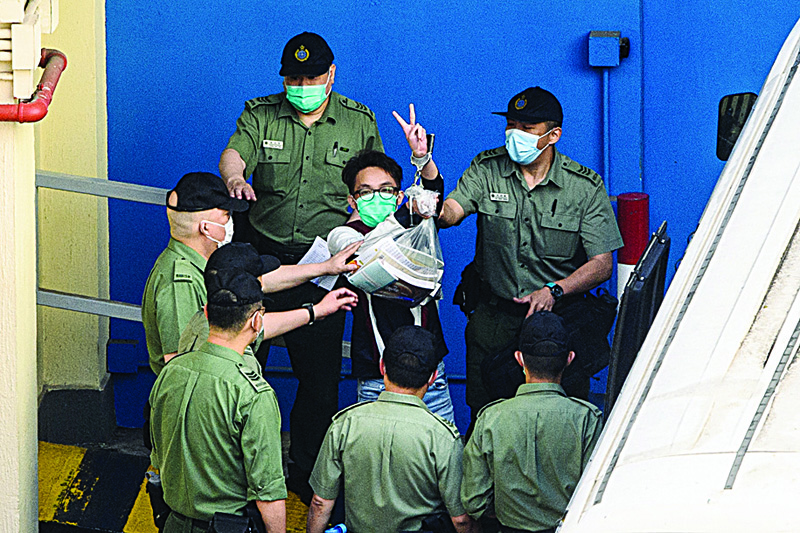 HONG KONG: Pro-democracy activist Figo Chan (center) gestures as he walks to a Hong Kong Correctional Services van before being driven to the District Court in Hong Kong on Friday. - AFP
HONG KONG: Pro-democracy activist Figo Chan (center) gestures as he walks to a Hong Kong Correctional Services van before being driven to the District Court in Hong Kong on Friday. - AFP
HONG KONG: Hong Kong democracy campaigner Figo Chan wore an "Avengers" hoodie into court for his jail sentence in a nod to his love of the comic series and its tale of heroic redemption. He says prison will make him a "better man". Chan, 25, was one of eight activists jailed on Friday for taking part in 2019's huge pro-democracy protests, the latest in a long line of democracy figures now behind bars. It was a prospect Chan was sanguine about. "It's better for me to be jailed when I am still young," he told AFP ahead of his sentencing.
"I can do sports and train my muscles. Isn't that great? I will work out and read in jail then I will be a better man when I am out." Few would have been surprised to see Chan chose to wear his beloved "Avengers" hoodie to court. It was what he wore a few weeks ago when he went into detention ahead of his sentencing. The movie franchise's story of superheroes battling seemingly insurmountable odds has always been popular in Hong Kong.
But it has taken on extra significance in recent years, especially among younger generations, as Beijing cracks down on freedoms. Hong Kong's democracy movement is on its knees. Most of its leaders are under arrest, jailed or have fled overseas. "I think we are at a low point," Chan said. But he is adamant Hong Kongers still want the right to choose their leaders and will one day hit the streets again. "I look forward to one day reading while I am in jail that two million Hong Kongers marched," he remarked.
From pride to politics
Like so many of Hong Kong's young pro-democracy figures, Chan became an activist as a teenager. He recalled beaming with patriotic fervor as a child when Beijing held the 2008 Olympics. "I really wanted to travel in mainland China and I believed I was a proud Chinese person". But that patriotism dissipated as he went through adulthood. "Nothing can give me that recognition of (Chinese) identity anymore," he said.
Chan became a key figure within-and later led-the Civil Human Rights Front, the group that organized some of the massive rallies that took place in 2019 which hundreds of thousands of Hong Kongers attended. The CHRF was not a radical organization and was far removed from the masked front liners who routinely battled police. It espoused non-violence and always sought permission for its marches.
When that permission became routinely refused, the group held rallies anyway, arguing Hong Kongers had a right to be heard. Hong Kong's courts have consistently ruled that attending unlawful rallies, even peaceful ones, is a crime and that the right to expression has firm limits. On Friday, Chan got 18 months in jail. Police have also begun a separate investigation into the CHRF itself, saying it has failed to adhere to regulations governing local societies.
Since 2019's huge rallies, protest has become impossible in Hong Kong, with authorities using the pandemic and security concerns to deny permission. On Thursday, the June 4 Tiananmen vigil-an annual event usually attended by tens of thousands-was banned for the second year in a row, with authorities citing the coronavirus. Since 2019's protest, China has imposed a sweeping national security law on the city to criminalize dissent.
Chan is adamant that while short term stability has been returned by force to Hong Kong, Beijing is setting itself up for more unrest in the longer term. "When even the CHRF-which advocates peaceful, rational, lawful and non-violent expression-is not allowed, how can you convince people to remain peaceful?" he asked. "My dream is when I am released, all my friends will be back in Hong Kong, including those who are now in exile or behind bars," he added. "Then many of us will gather here, right outside the government headquarters, for a grand celebration." - AFP




